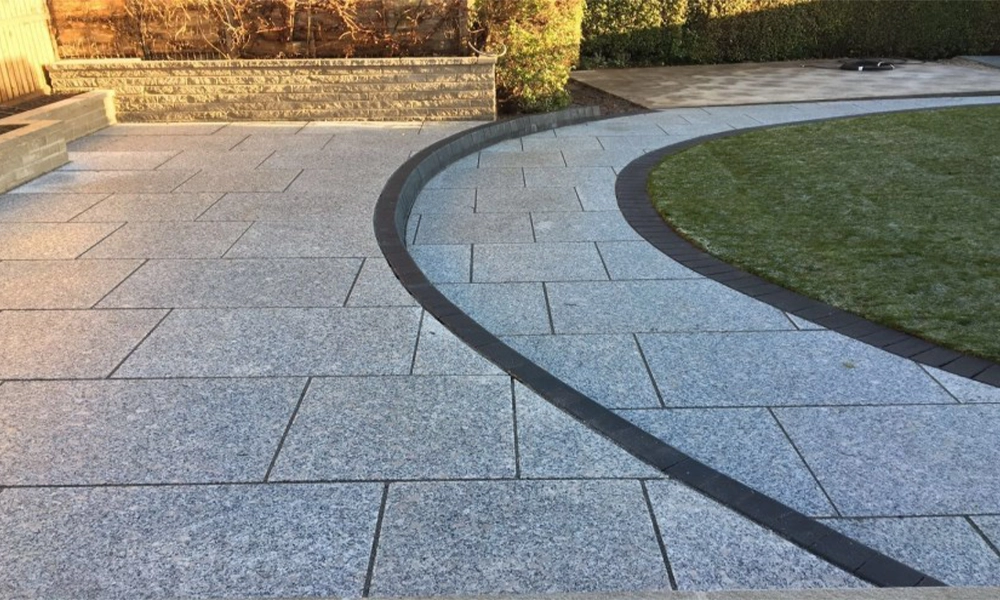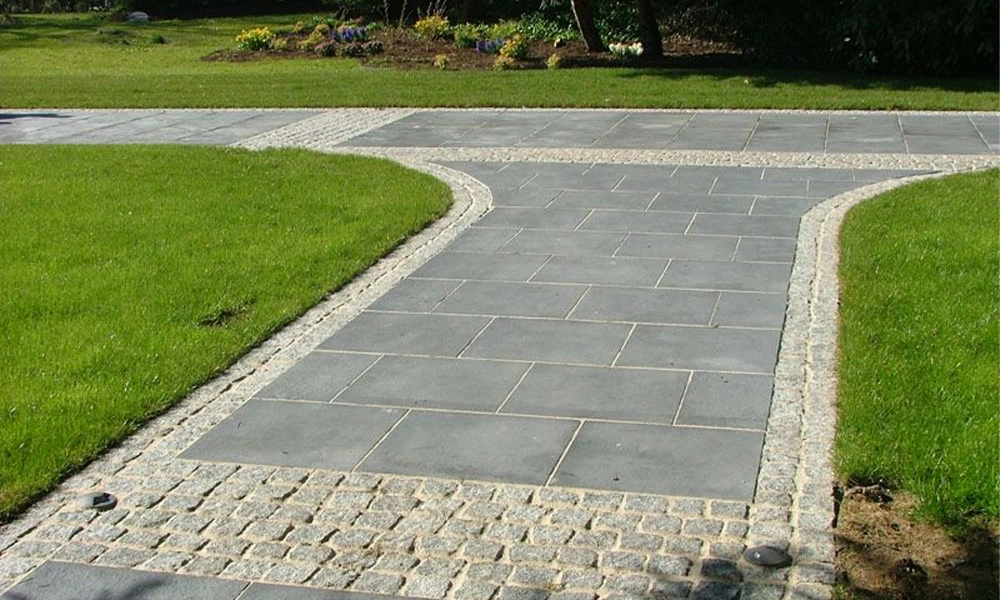What is Granite?
Granite is an igneous rock formed from the cooling and solidification of magma beneath the Earth’s surface. This stone is primarily composed of quartz, feldspar, and mica, which give it a granular texture and a wide range of colors and patterns. One of the most sought-after variations is Veincut Granite, known for its unique veining and striking appearance. Its natural beauty and strength make granite, including Veincut Granite, a preferred material for various construction and interior design purposes
Pros of Granite Stone for Home
Granite is a popular and highly durable natural stone, making it a prime choice for homeowners looking for long-lasting, aesthetically pleasing materials. When it comes to the Pros and Cons of Granite Pavers, the advantages of using granite stone for your home are numerous, especially for both interior and exterior applications. One of the standout options in granite pavers is Honey Jasper Granite, which offers a unique blend of colors and textures that enhance the natural beauty of any space.

1. Durability
One of the most significant advantages of granite is its exceptional durability. As one of the hardest natural stones, granite is highly resistant to scratches, chips, and dents. This makes it an ideal material for high-traffic areas such as kitchens, bathrooms, and hallways, where surfaces are prone to wear and tear.
Granite is also heat-resistant, meaning it can withstand hot pots and pans, making it perfect for kitchen countertops. Whether you’re cooking or hosting guests, granite will maintain its integrity and appearance over time.
2. Aesthetic Appeal
Granite comes in a wide variety of colors, patterns, and textures, making it easy to find the perfect match for any interior style. Whether you prefer subtle, light hues or bold, dark shades, granite offers a stunning visual appeal that can enhance the look of your home.
Because granite is a natural stone, each slab is unique, with its own variations in color and pattern. This means that when you choose granite for your home, you’re opting for a one-of-a-kind piece of natural beauty. Its luxurious appearance can elevate the design of any room, making it a popular choice for kitchen countertops, bathroom vanities, and even as a feature wall or flooring material.
3. Easy Maintenance
Granite is relatively easy to maintain, especially when compared to other materials like marble or wood. With proper sealing, granite countertops and surfaces are resistant to staining, water damage, and bacterial growth. The non-porous surface prevents liquids from penetrating the stone, reducing the chances of stains from coffee, wine, or oils.
Cleaning granite is also straightforward. A simple wipe with a mild soap solution and a soft cloth is often all that’s needed to keep it looking pristine. Regular sealing (every 1 to 2 years) ensures that the stone continues to resist stains and maintains its shine.
4. Increases Home Value
Granite is seen as a premium material, and incorporating it into your home can increase its resale value. Potential buyers are often drawn to homes with granite countertops, especially in kitchens and bathrooms, as the material conveys a sense of luxury and quality. If you’re looking to improve your home’s appeal in the real estate market, granite can be a smart investment.
5. Heat Resistance
Granite countertops are highly heat-resistant, which makes them perfect for use in the kitchen. You can place hot pans directly on a granite surface without worrying about causing damage, as the stone won’t warp or scorch easily. This property adds to the functionality and practicality of granite in everyday use, especially in cooking environments.
6. Timeless Elegance
Granite has been a popular choice for centuries, and its classic elegance never goes out of style. Whether you have a modern, contemporary, or traditional home, granite complements various design aesthetics. Its timeless look ensures that it will continue to be stylish and relevant in your home for many years to come.
Cons of Granite Stone for Home
While granite is a premium material with many benefits, it’s important to consider the Pros and Cons of Granite Pavers to make an informed decision. As with any natural stone, there are some drawbacks to using granite in your home.

1. Expensive
While granite offers significant benefits, it is often more expensive than other countertop materials such as laminate, quartz, or even some types of marble. The price of granite can vary depending on the quality, color, and source of the stone. Premium granite with unique patterns or rare colors can be particularly costly.
Additionally, the installation process for granite can be more expensive compared to other materials due to the labor-intensive process of cutting and fitting the stone. If you’re on a budget, granite may not be the most affordable option.
2. Heavy Weight
Granite is a dense and heavy material, which means it requires sturdy cabinetry or support for installation. For countertops, this may not be a problem, but if you plan to use granite for other applications such as flooring or wall cladding, additional structural considerations may be necessary.
The weight of granite can also make it difficult to transport and install, which can further increase costs and complications. Be sure to check the load-bearing capabilities of your home before committing to large granite slabs.
3. Requires Regular Sealing
Although granite is relatively low-maintenance, it still requires periodic sealing to maintain its durability and prevent stains. Without proper sealing, granite may become more susceptible to liquids and oils seeping into the stone. Typically, granite countertops should be sealed every 1-2 years to ensure they stay protected.
While the process of sealing is simple, it does require attention and upkeep. For busy homeowners, this could be considered a disadvantage, as other materials like quartz don’t require sealing at all.
4. Potential for Cracks and Chips
Despite granite’s durability, it is not indestructible. While it’s resistant to scratches, it can still crack or chip if subjected to heavy impact or pressure. Dropping heavy items on a granite surface, such as cast-iron pans or sharp objects, could cause damage to the stone.
Granite surfaces, especially in high-traffic areas, may also suffer from small chips or cracks over time, particularly if they are not properly cared for. While these issues can often be repaired, they may still detract from the stone’s aesthetic appeal.
5. Imperfect Installation
Granite slabs require precise cutting and fitting, and an imperfect installation can lead to gaps, seams, or uneven surfaces. If the granite is not installed correctly, it could negatively affect both the appearance and function of your home. This issue is particularly common if you’re using large, heavy slabs and don’t hire an experienced professional for installation.
In some cases, seams between granite pieces may be noticeable, especially if the stone has an intricate pattern or color variation. While professionals can minimize this effect, it is something to be mindful of during installation.
6. Staining Potential
Although granite is generally stain-resistant, it is not entirely impervious to staining. Certain liquids, such as oil, wine, or coffee, can still cause discoloration if left on the stone for too long. While granite surfaces are less likely to stain than marble or other porous stones, regular cleaning is essential to avoid long-term damage.
Sealing the stone properly helps to prevent stains, but failure to do so or neglecting to clean up spills promptly can result in permanent marks on the surface.
| Aspect | Pros | Cons |
|---|
| Durability and Strength | Granite is highly resistant to damage and wear, making it perfect for high-traffic areas and outdoor use. | Granite can be expensive, especially high-quality or rare slabs. Installation costs can be high. |
| Timeless Aesthetic Appeal | Granite offers a wide range of colors and patterns, enhancing the beauty of any home. | Granite can be heavy and difficult to transport, requiring professional installation. |
| Low Maintenance | Granite is easy to maintain, requiring only periodic sealing and regular cleaning. | Granite can crack or chip if subjected to heavy impact. |
| Heat and Scratch Resistance | Granite is heat-resistant and scratch-resistant, ideal for high-use surfaces like kitchens and walkways. | Granite requires regular sealing to maintain its resistance to stains and liquids. |
| Increases Property Value | Granite adds luxury and durability, increasing the value of the home or property. | If improperly installed, seams may become visible, detracting from the stone’s appearance. |
| High Cost | N/A | Granite surfaces can become slippery when wet, posing a safety hazard in wet areas. |
| Heavy and Difficult to Transport | Granite is heavy, which can make installation complicated, and requires sturdy support. | Granite is heavy, which can make installation complicated, and requires sturdy support. |
| Prone to Cracking under Heavy Impact | Granite can crack or chip when exposed to heavy impacts, potentially damaging surfaces. | Granite can crack or chip when exposed to heavy impacts, potentially damaging surfaces. |
| Requires Sealing | Granite requires regular sealing to maintain its resistance to stains and liquids. | Granite requires regular sealing to maintain its resistance to stains and liquids. |
| Imperfect Installation Can Lead to Visible Seams | Granite can be expensive, especially high-quality or rare slabs. Installation costs can be high. | Granite surfaces can become slippery when wet, posing a safety hazard in wet areas. |
Conclusion
Granite is an exceptional natural stone that can add beauty, durability, and functionality to any home. With its wide range of colors, heat resistance, and long-lasting appeal, granite continues to be a top choice for homeowners. However, it’s essential to consider its drawbacks, including cost, weight, and the need for periodic sealing.
When choosing granite for your home, it’s crucial to weigh the pros and cons carefully. If you’re willing to invest in high-quality materials and maintenance, granite can be a stunning addition that will enhance the overall aesthetic and value of your property. However, if you’re on a tight budget or looking for a more low-maintenance option, you may want to explore other materials.
Ultimately, granite’s durability and timeless beauty make it a worthwhile investment for many homeowners, with Hunterpavers offering top-quality granite pavers that ensure long-lasting elegance and functionality. This makes granite one of the most sought-after stones in the market today, and a popular choice for those looking to enhance their outdoor spaces with premium materials.


